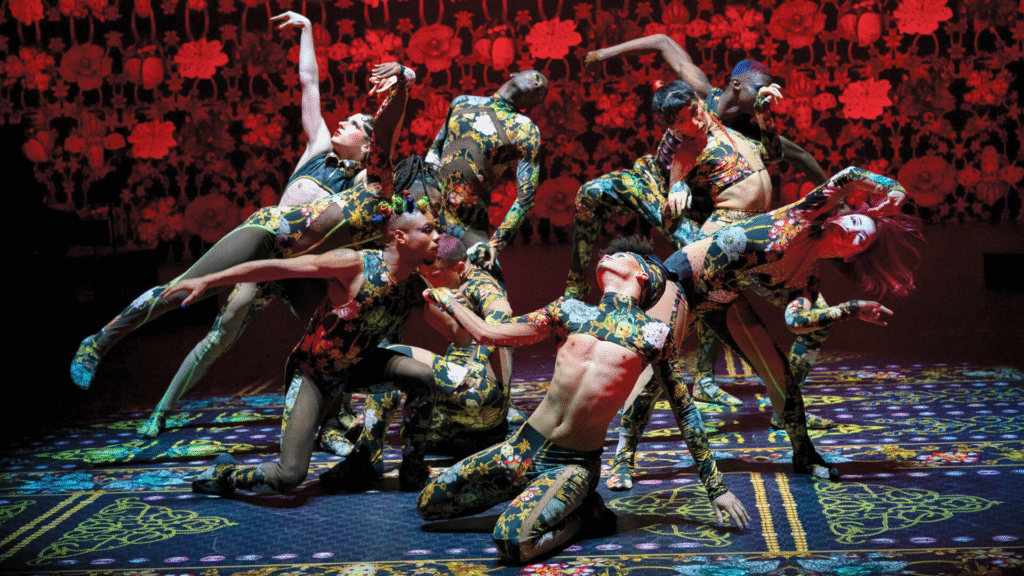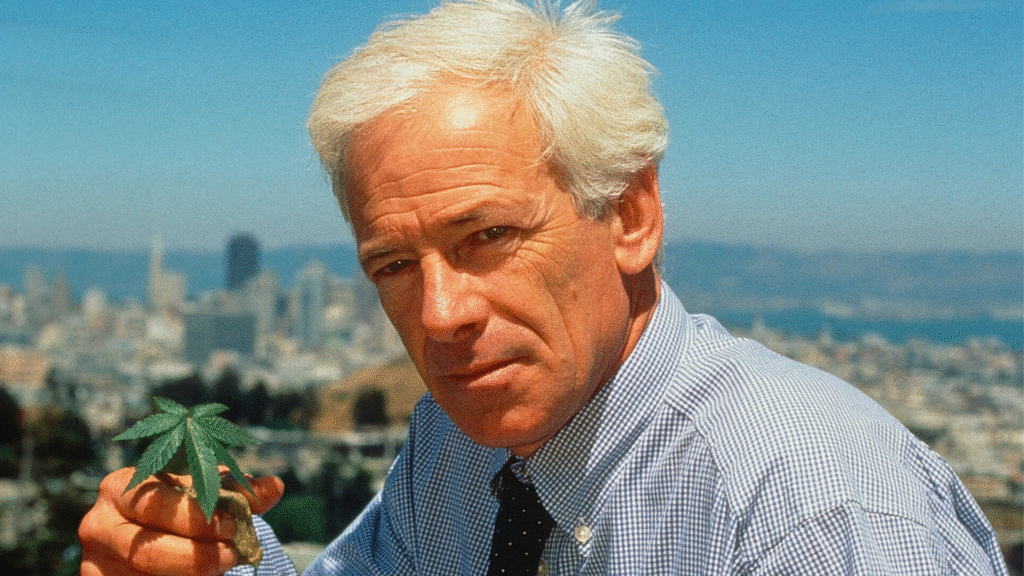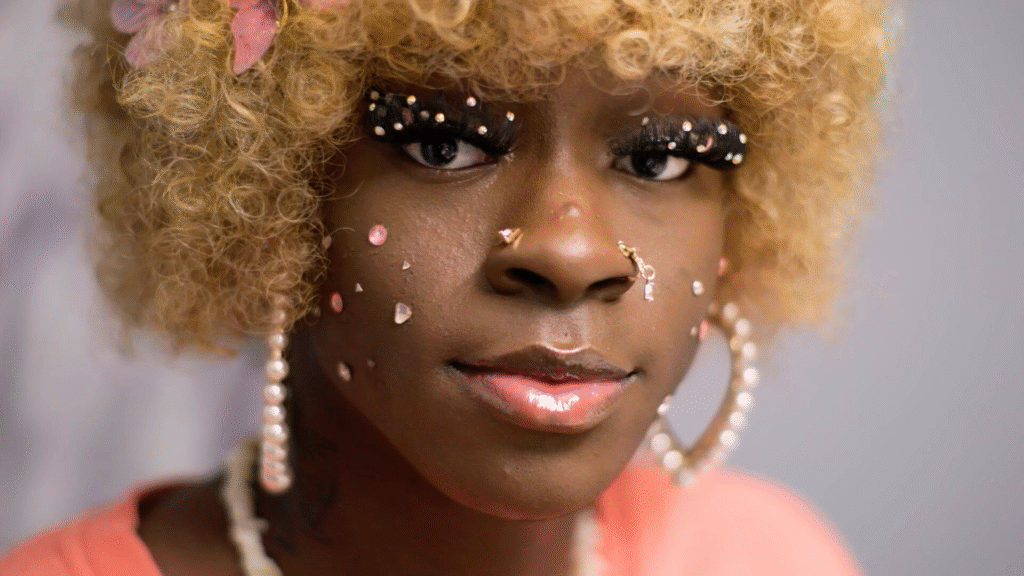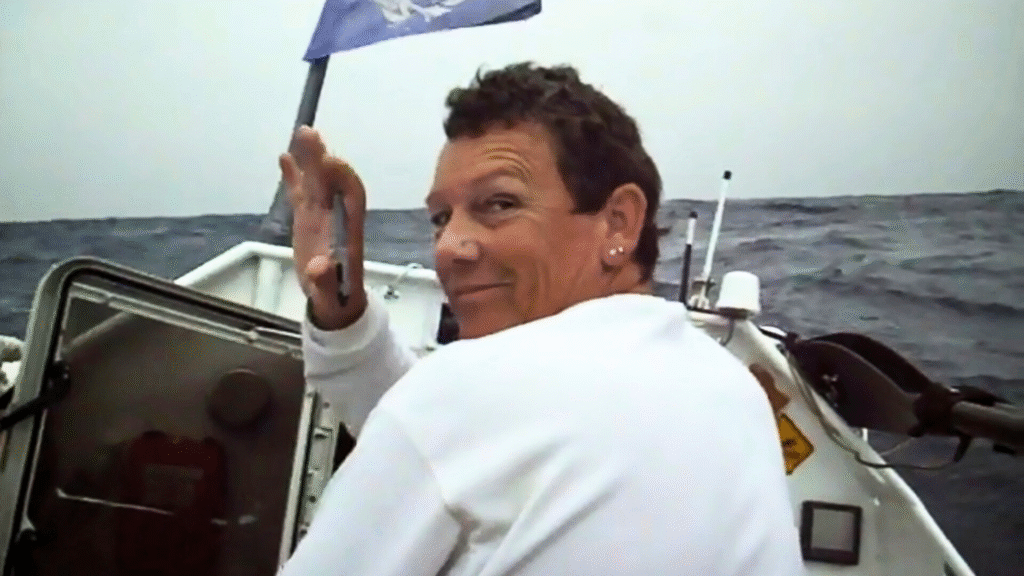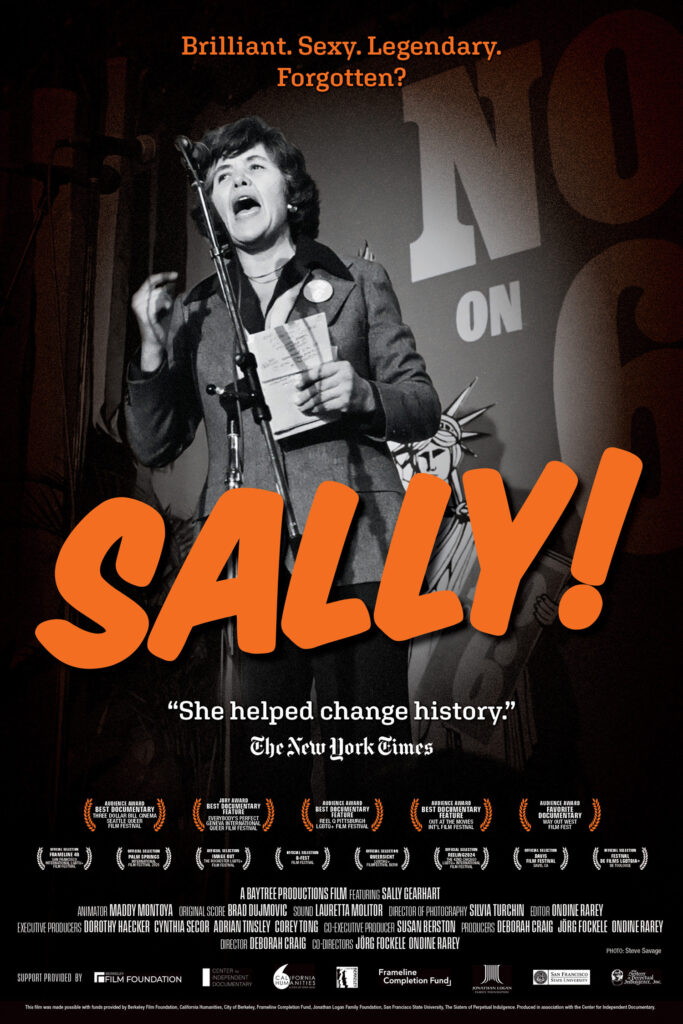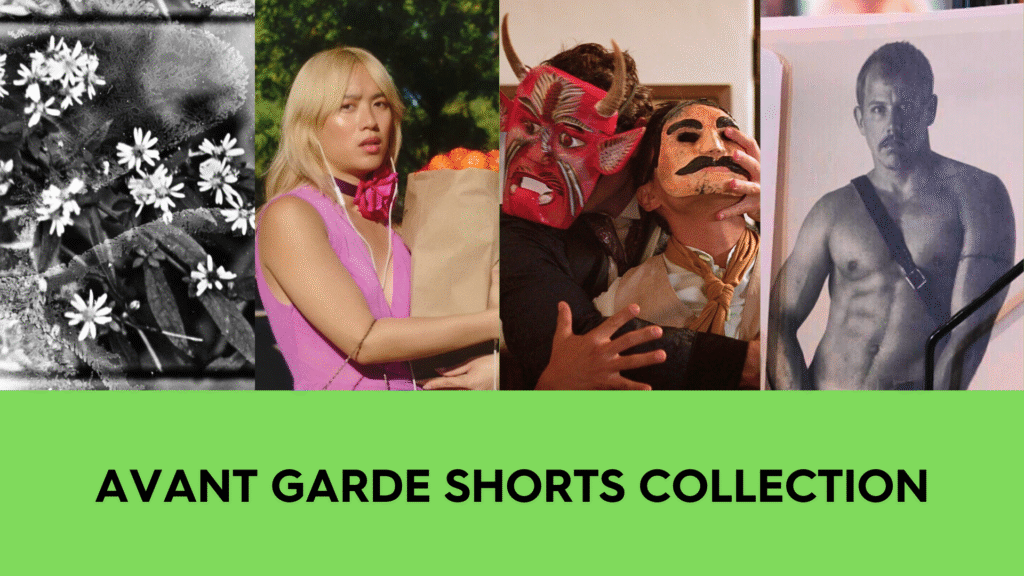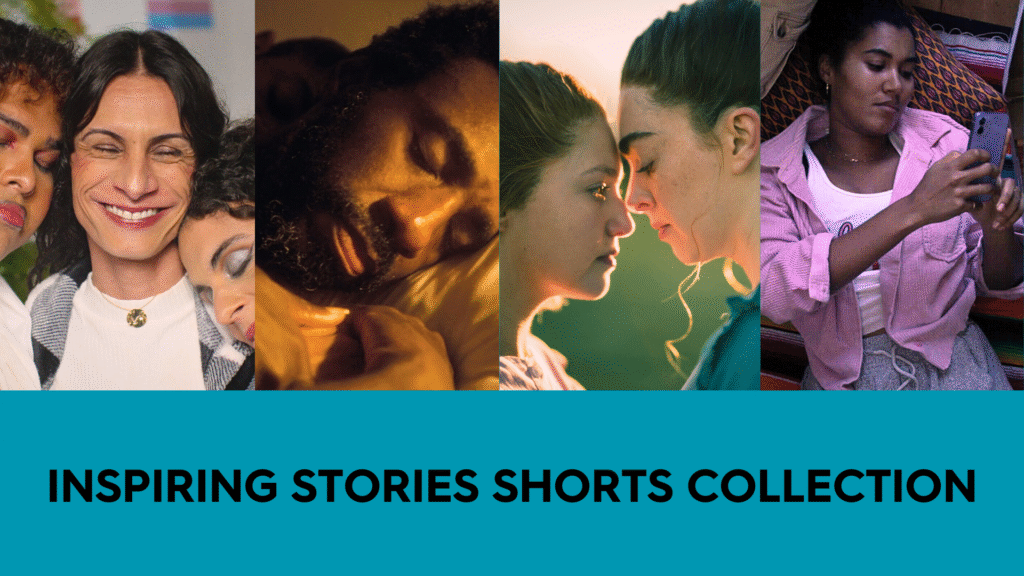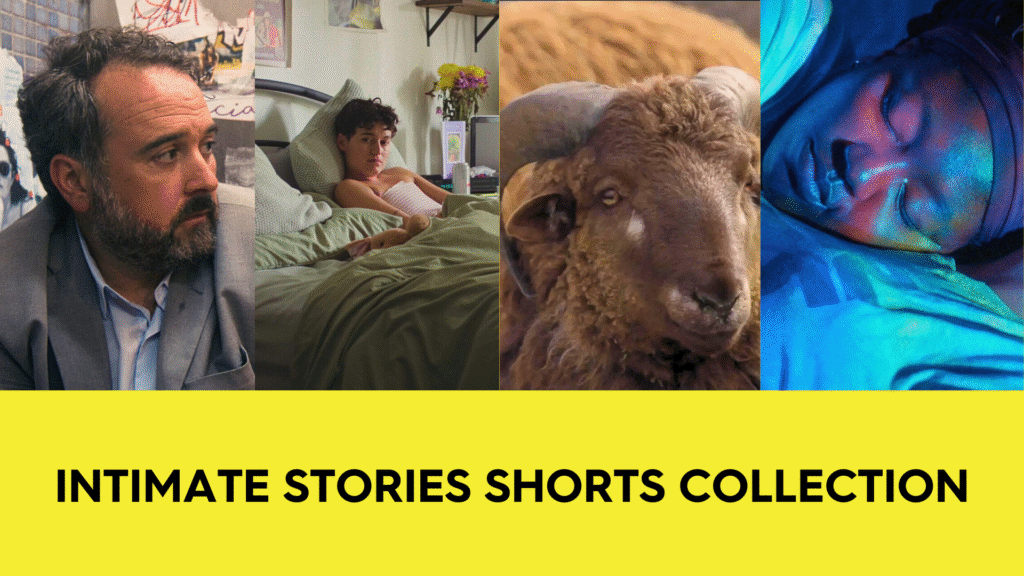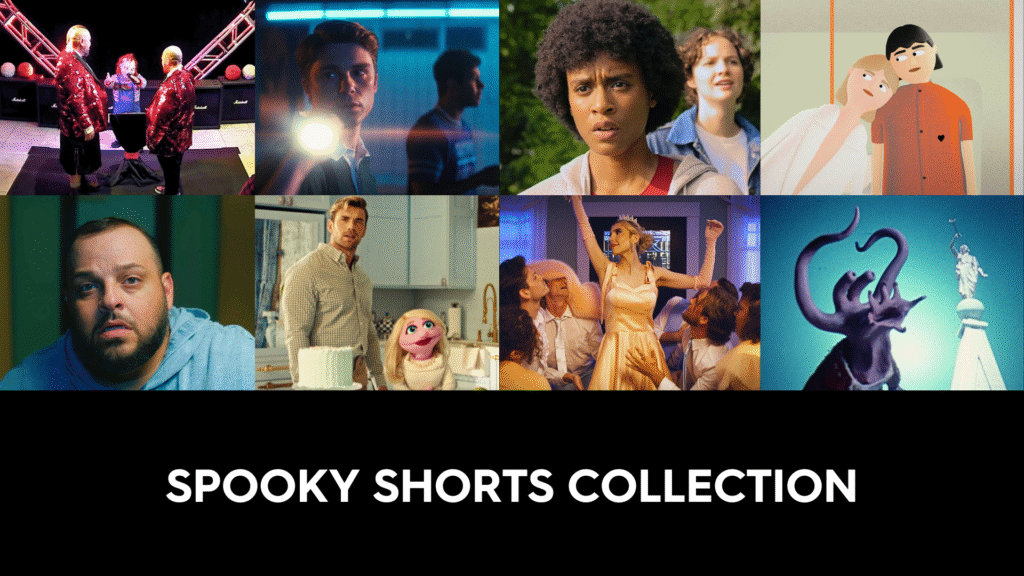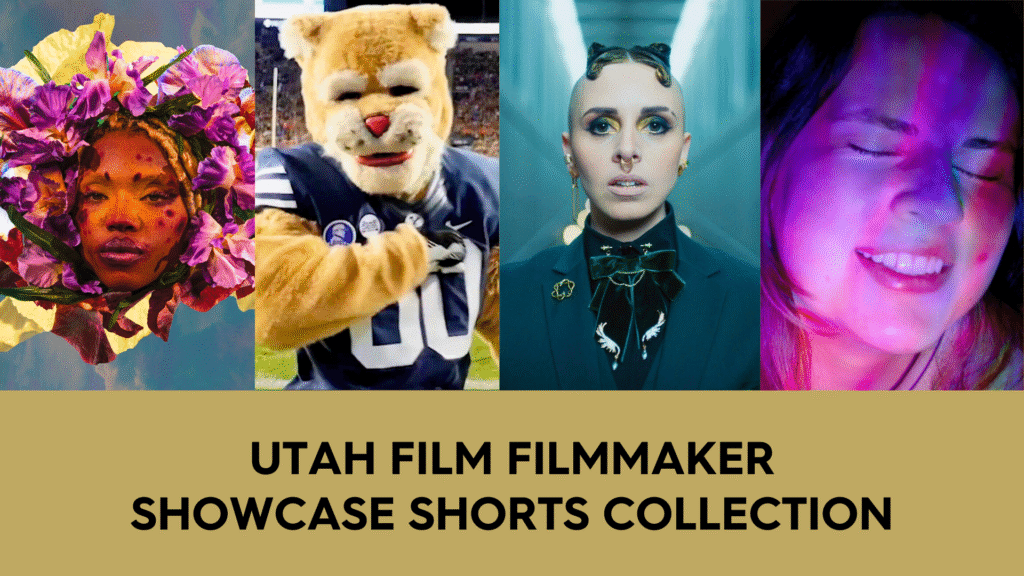EDITOR’S NOTE: For the curtain raiser of the 2025 Utah Queer Film Festival, see this link.
The theme of fearless queerness permeates the slate of six feature-length documentaries and 40 short films in this year’s Utah Queer Film Festival slate. In some instances, the theme is fully manifested, while in others, it starts from a promising premise only to be stunted and, finally in other offerings, it is the organic awakening that fear can be overcome by resilience, patience and perseverance, even in the darkest circumstances.
Although the feature-length slate is among the smallest in the festival’s history, the lineup of six documentaries, indeed, is a bracing exploration of fearlessness, highly elucidating and even gripping in their entertaining impacts. The Utah Review screened a collection of feature-length and short films, for this preview.
FEATURE-LENGTH FILMS
Directed by multimedia artist Rashaad Newsome and Johnny Symons, Assembly is a well-crafted documentary of the artist’s most ambitious installation and performance exhibition in New York’s historic Park Avenue Armory. Accompanying the ample clips highlighting the 2022 exhibition, which was staged in the Wade Thompson Drill Hall that encompasses 55,000 square feet, the documentary brings the audiences into Newsome’s creative process, from its earliest seeds to its full realization and to its postscript. ArtForum’s Daniel Culpan aptly called Newsome’s exhibition as a 21st century “reboot of Paris Is Burning.”
The film justifiably captures Newsome’s remarkable undertaking in a well-paced comprehensive retrospective. Among the exhibition’s most striking elements of embodied politics and really its core was the nonbinary giant AI Being. The avatar is a unique nobinary composition simultaneously embodying the West African griot, literally a poet and historian, and a sardonic vogue queen, whose appearance is almost godlike. Being’s face evoked an African mask and referred to Newsome as their “father.” Newsome sees opportunity in the AI era. In a 2024 interview published elsewhere, Newsome explained, “The foremost goal of my research is to decolonize AI by developing and implementing counter-hegemonic algorithms. These algorithms are designed to prioritize non-Western indexing methods and highlight alternate histories and archives, including abolitionist, queer, and feminist texts. By doing so, I aim to create AI systems that are more inclusive and representative of diverse perspectives, challenging the dominance of Eurocentric narratives in technology.”
The film is presented by Utah Film Center’s Black, Bold and Brilliant. The screening will open with the short film, Denim.
Anchored in its masterful use of archival materials, Join the Club, directed by Kip Andersen and Chris O’Connell, documents the legacy of Dennis Peron, a gay Vietnam War veteran who established the Cannabis Buyers’ Club in San Francisco during the 1970s. Person’s story takes on an epic flair, which the directors handle appropriately and effectively. There are multiple sources of stigmatization that must be overcome: the use of marijuana, most notably for its medicinal purposes; the onset of the AIDS epidemic in the queer community and, of course, one’s own sexual and gender identity.
In addition to the archival sources, we hear Peron’s own words in interviews that were recorded after he suffered a stroke in 2010. He died in 2018. The result is Peron’s emergence as the paragon of fearlessness. He confounded law enforcement, city officials, state attorney generals and even the federal government, who tried to silence his efforts forever. Audiences will be especially drawn to and likely infuriated by clips with Joseph Bannon, a former San Francisco police officer who is gay and relentlessly pursued efforts to nail and prosecute Peron.
Even after California voters approved the legalization of medical cannabis in 1996, authorities still tried to thwart his and similar efforts. Although no federal laws support its legalization, 40 states, three territories, and the District of Columbia have legalized medical cannabis, while 24 states, two territories, and D.C. have legalized it for adult recreational use.
The film is presented by Through the Lens and Utah Filmmaker Showcase. The screening will include a pre-film musical performance by Moon Ray and a post-film talkback with O’Connell.
Other feature-length films include Jeffrey McHale’s It’s Dorothy, which explores the evolution of how generations of performers have portrayed the fictional character of Dorothy Gale, even since she was introduced 125 years ago in L. Frank Baum’s The Wonderful Wizard of Oz. The film documents the universal appeal for the quest to fly over the rainbow and find home again.
The documentary Just Kids, directed by Gianna Toboni, follows three teens in states that restrict gender-affirming care. The Hollywood Reporter’s Lovia Gyarkye noted, “Just Kids falls in the category of recent docs like Preconceived and Zurawski v Texas, which premiered at Telluride, that survey how the right has effectively mobilized to dismantle the civil rights progress of the last 50 years. Like these other films, Toboni’s feature takes a straightforward approach to uncovering details that will be illuminating for many viewers. One only hopes that it gets in front of the audiences who need to hear its message the most.” This screening features a pre-film musical performance by Azul Bolivarr and the pre-feature shorts, A-Okay and Dragfox.
Soraya Simi’s Row of Life chronicles the 2020 attempt of Angela Madsen, who, at the age of 60, to become the first paraplegic and oldest woman to row the Pacific Ocean from California to Hawaii. However, a year after being lost at sea, Madsen’s boat was discovered on Mili Atoll in the Marshall Islands, the same spot where parts of Amelia Earhart’s plane had been found. As a result, Simi’s film took on an expanded perspective. In an interview published elsewhere, Debra Bogan-Madsen, Angela’s partner and wife, became the film’s principal character, “What kept me going was Angela’s spirit,” Simi said in that interview, “If it had been a story about anyone except Angela, I think I would have thrown in the towel because she just so exemplified what it means to overcome any obstacle.” This screening will feature a pre-film spoken word performance by Artikulate and the pre-feature short film, Body Stories.
SALLY!, directed by Deborah Craig, Ondine Rarey and Jörg Fockele, is a lively entertaining portrait of Sally Gearhart, pioneering activist in both feminism and the queer movement. She died in 2021 at the age of 90. One of the film’s most important objectives is to ensure Gearhart’s legacy, which is not as widely known, is not erased from history. As Rarey explained in an interview with Seismic Sisters, “I think a lot of the history Sally helped make in two movements has been forgotten, to our peril, because history is repeating itself. Freedoms and rights women won in the 1970s are being taken away while attacks against trans people are almost identical (the same words, the same methods) to those gays and lesbians experienced in the 1970s and 1980s. So, she made a huge difference and I think the fact that her story has been erased / forgotten is part of the reason we’re fighting similar battles today.” This screening includes a pre-film poetry performance by Afia Chin and the pre-feature short, Seat 31: Zooey Zephyr.
SHORTS COLLECTIONS
With an eye toward short films as video art pieces, the selections, reserved particularly for mature audiences, highlight imaginative approaches in first-person, documentary, narrative and animated forms.
Avant Garde Shorts Collection
Solid in its nuanced sensitivities and gentle humor, Sally Tran’s Clementine is about a late-blooming trans woman grappling with a life-altering dilemma, and with the help of her best friends, processes the complexities of defining her womanhood on her own terms. Tran delivers effectively on the creative brief: “As the director of ‘Clementine,’ embarking on this journey has been profoundly enlightening for me as a cisgender woman,” Tran explained in a director’s statement. “Being entrusted with the opportunity to delve into the intricate narrative of a transgender coming-of-age story has opened my eyes to the complexities of identity. This tale resonates deeply with me as an immigrant, as it explores themes of identity, a struggle I have personally faced. However, the exploration of one’s identity within their own body and sexuality is inherently intricate.” The Eating of an Orange by May Kindred-Boothby is a delightful, witty seven-minute companion to Clementine, but this film is rendered in animation. In an interview published elsewhere, the director explains her choice of fruit for the film, “I mean, they’re so delicious. It just made sense. That was actually the start of the idea, that someone who lived in this conventional world being given an orange. I think there’s something about the sweet, innocent pleasure of eating an orange, which just sort of said a lot. And also, obviously, the sort of visual reference of what it looks like. And I just love oranges.”
Everything You Want by Mariana Machado, an award-winning Brazilian filmmaker and photographer living in Brussels, is a beautifully shot intimate contemplation about immigrants living in Brussels who are locked out of their home and are resolute in finding their place of belonging in an unfamiliar land.
Adrià Guxens’ Kokuhaku, is a miniature masterpiece. The short focuses on Tadashi, a young Spanish-Japanese actor who performs in the Onagata tradition, which refers to male actors who play female roles in Japanese Kabuki theater. Tadashi flashes back to his childhood to relive a significant memory. Concise and cogent, the film synthesizes diasporas of culture in an eye-opening perspective.
Other shorts include AutoErotica: We Buy Gay Stuff by Claire Timothy, takes audiences from an unassuming “We Buy Gay Stuff” sign in San Francisco’s Castro district, complete with a striking leather daddy illustration, to an unexpected treasure trove of queer history. La Máscara de Emiliano (Emiliano’s Mask) by Roze JC Zepeda, takes audiences back to Mexico in 1914, when Emiliano Zapata seizes explosives from Ignacio de la Torre y Mier, his enemy’s vain son-in-law, an act that rekindles a past romance that transcends political divides. My Endless Eclipse by Bijan Aarabi is a narrative about a transgender woman who has hidden her gender identity and she eventually flees Iran to escape an arranged marriage, but she falls into the hands of human traffickers.
Marrow of my Bones by Canadian filmmaker Karly McCloskey is a video art piece that synthesizes digital special effects, compositing, frame-by-frame animation, and 16mm-hand -processed film. Through material-based exploration, this film plays with the concept of post-humanism via the return to nature and the body in a tactile and gritty manner. From Portugal, Pietra by Cynthia Levitan is a stop-animation piece where flowers are exchanged and a friendship blossoms between a transgender woman and her elderly neighbor.
Inspiring Stories Shorts Collection
An impressive screenplay and excellent acting round out the exceptional short film Home by Donja R. Love. T is a homeless queer teen in New York City who just misses curfew at a shelter and as the evening progresses, he becomes more desperate about finding a warm place for the night. Aware that people living with HIV are eligible for housing, he contemplates whether or not he should take one option in particular. Pay attention to Love, a playwright, poet and filmmaker whose work has earned honors, including the Laurents/Hatcher Foundation Award and a Princess Grace Playwriting Award. One play, one in two, which premiered pin 2019, was inspired by the 2016 Centers for Disease Control and Prevention (CDC) analysis finding that one in two Black men who have sex with men will be diagnosed with HIV in their lifetime.
Skates by Dani Payne would be precisely the meaningful, sensitively told story that would be perfect in a 21st century version of ABC-TV’s long-running classic series of After School Special. Two friends who have been besties forever must contend with bittersweet realities about the strength of their relationship when a third person arrives on the scene. Again, solid dialogue and acting propel this short.
The joyful sense of camaraderie really comes through We’ll Go Down in History by Cameron Richards, Charlie Tidmas, from the U.K. It is a documentary chronicle of TRUK United, a grassroots, proudly trans football club. A compelling embodiment of the festival’s theme of fearless queerness, the most endearing takeaway from the short film is how thoughtfully prepared the next generation of players is ready to sustain TRUK United’s legacy.
Two shorts from Brazil are highlighted in this collection. One is Linger by Thiago Kistenmacker, about two septuagenarian men who had an affair in their youth and meet again after the wife of one of them has died. The other is Revenge by Mari Penteado and Eduardo Campos, about a 43-year-old transgender woman who works as a community health agent in Guarulhos, Brazil.
From the U.K., Sister Wives by Louisa Connolly-Burnham, is a multi-layered love story, set in 2003, focusing on young women who live in a strict, fundamentalist, polygamous society in Utah.
Intimate Stories Shorts Collection
From Canada, Are You Scared to Be Yourself Because You Think That You Might Fail? by Bec Pecaut is a perfect match for the festival theme in this particular collection. Framed effectively in an immersive observational perspective, this short is about Mad who is recovering from top surgery and is torn simultaneously by wanting the attention of their partner as well as accepting the help of their mother. The film won a Young Director Award’s gold in the Changing the World Frame by Frame Category. In an interview published elsewhere, Pecault talked about the impact of the film and its recognition for a YDA gold. The film was born from the lack of nuanced and specific depictions of trans experiences on screen. However, these experiences are not limited to the physical form and I am also interested in how we as trans people in a state of self-actualising flux, relate to those closest to us. The natural tension existing between individual identity and family is a fundamental playground of my artistic practice,” Pecaut noted. “I wanted to make a film that has grace for everyone involved in the process of transition, including our partners, family members and friends. I think anyone who has gone through a major surgery and is forced to rely on other people can relate to the main character’s anxiety. It’s really a human story. And that’s how trans people need to be viewed, as humans (not political talking points).”
A documentary short from Chapman University’s Dodge College of Film and Media Arts, Handwoven, by Dasha Levin, Mason Cazalet, Matthew Wisdom and Mihika Das, is a substantial portrait for nine minutes. The subject is Nikyle Begay, a Diné non-binary shepherd and weaver; who is committed to preserving their way of life through the traditional art of weaving. What is striking is listening to Begay talk about the readiness of their grandmother and mother in accepting their identity. In fact, it is the traditional art connection between Begay and their grandmother that is most elucidating.
From this year’s Sundance shorts film program, Hold Me Close by Aurora Brachman (co-director, cinematographer and editor) and LaTajh Simmons-Weaver (co-director and co-editor) is an intriguing documentary about Tiana and Corrine, two Black queer women who are a couple. It was shot on 16mm film and was recorded with live mics that the two women used and recorded themselves daily for a month. The intimacy is portrayed with fine sensitivity,
Poreless by Harris Doran is destined to be a big audience pleaser at UQFF this year. Notably, Doran was among the producers of Kokomo City (2023, D. Smith), which premiered at Sundance and screened again in 2023 at the Utah Film Center’s Damn These Heels festival. That 73-minute documentary galloped at a scintillating pace, weaving in the stories of four Black transgender sex workers, without moralizing judgment, sociopolitical commentary from experts, or cutaways to explain terms or for others to anchor the context of their unashamedly candid stories.
In Poreless, a fantastic comedy short that is as smart as it is cute, Doran, who teamed up with filmmaker and actor Fawzia Mirza, gives us Akram, a fabulous, queer, Muslim beauty entrepreneur (procure and star Akbar Hamud) who competes in a Shark Tank-like contest, only to be setback after by an untimely allergic reaction just ahead of his big moment to pitch the product.
Other shorts include The Exchange by Amaia Yoldi, a narrative from Spain: Antonio and Inés are two complete strangers who arrange a meeting through a second-hand app. Inés wants to sell something she no longer tolerates; Antonio wants to try it. From Iran, White Glass Globe by Hassan Jafari Dariush, is a dramatic narrative about the romantic relationship between two girls, one Iranian and one Afghan, in a religious and traditional society.
Spooky Shorts Collection
Bergamot by Hsu Chien is a dynamite entry for this collection. The 2023 short, from Brazil, has garnered 98 awards and has screened at more than 130 film festivals. It is a classic slasher film, with its narrative reflecting actual events in the Rio de Janeiro gay community. The title is metaphorical, referencing the name associated with a tangerine common in Brazil that is heralded as an aphrodisiac.
A distinctly contemporary science fiction short, Evaders by Hudson Shelton is bound to send some chills. With the authoritarian government now controlling gender and family arrangements, Ziya and Walker are 17 and it is their next birthday when they must have their Specification ceremony, where they must choose to be male or female and will subsequently be sorted into nuclear families. Before that Specification rite, all young society members live sexless and without a gender. Both teens have assumed that they would inevitably be matched forever, but they also are inclined to specify as male, knowing that if they follow through, Specification will mean that they cannot be united. They believe their only option is to escape their society.
Turkish short films are characterized for their intense drama and Vermilyon by Dilay Sengul certainly falls into the category, with jealousy as the motivating force for this thriller. In this case, the man is compelled to confront the person in front of him as well as the repressed woman within himself.
Prom Party Massacre by Jordan Gustafson is a hoot and a holler, a hybrid slasher-musical with a gay high school student who throws a prom party in the hopes of wooing the closeted football captain. However, when the bodies of the school’s most popular students start turning up, the others wonder about the killer’s identity. Great production values animate this fun short. In its premiere in Portland’s Queer Screams Film Festival, it took best editing honors.
Not a fictional narrative but a documentary that seems well sorted for a horror movie collection, Minister Chucky by Graham Kolbeins and Jonathan Andre Culliton might inspire other queer couples who are looking for novel settings when and if they decide to get married. In this case, the filmmakers decide to tie the knot in Las Vegas in a ceremony officiated by Chucky, the killer doll. It also marks the time when they decide to move to Canada,to avoid the inevitably hostile political landscape they have observed in the U.S. The filmmakers also launched a new queer film festival this year in Twentynine Palms, California.
Other shorts include Butterfly Kiss by Zohar Dvir, a narrative from Germany, after a partner in a lesbian couple panics and argues with her girlfriend after an unexpected proposal. The situation worsens when she wakes up in an apocalyptic reality and terribly discovers that her partner has transformed into a butterfly. Kilter by Bartley Taylor is set in the 1990s as a coming-of-age horror about the physical monster created from the silence around mental health. MascLooking by Jonathan Hammond starts as two friends, who discuss the pros and cons and gay dating apps, and then takes an ominous turn when one receives messages from a potential hookup with the handle, MascLooking. And the distance between MascLooking and the message recipient shortens dramatically. The narrative in She Raised Me by Ben Lewis features a struggling writer who discovers he’s dating the son of his favorite actress, and he will do anything to make (and keep) a meaningful connection. Finally, for a quirky twist, The Giant Brine Shrimp by Mike Cassidy brings us the state’s official crustacean who attacks Salt Lake City who destroys several iconic landmarks before being carried away and dropped by a giant bird.
Utah Queer Filmmaker Showcase
The Mascot by Delaney Plant stands out as an outstanding documentary short, made by the locally-based Leicester Productions. Charlie Bird dazzled crowds and fans across the country as Brigham Young University’s Cosmo the Cougar mascot, becoming a celebrity of sorts. When he came out as gay, and even after he was married, he has managed to show that it is possible to remain as a member of The Church of Jesus Christ of Latter-day Saints. However, as a role model, Bird also has been criticized for not using his visibility as extensively as possible, for other Mormons with queer identity and who want to still be connected to their faith. It is an effective case study about privilege and exclusion, as articulated in scenes featuring Stacey Harkey, a BYU graduate who also was an actor who wrote and acted for the school’s sketch comedy TV show, Studio C; Jillian Orr, who went viral in 2022 when she sewed a Pride flag into her graduation gown for BYU’s commencement, and Gerardo Sumano of the Mormon Stories podcast. The film’s thematic premise was validated in part by the fact that Bird declined to be interviewed for the documentary.
In an interview with The Utah Review, Plant, who has known Bird for many years, said that she had hoped that Bird would participate in the film. She had met with him in the preproduction stage but after seeing a rough cut, Bird decided not to participate. Plant said that she was “a bit curious about moving forward with his story,” especially after he had returned to BYU to pursue his master’s degree and after Deseret Book published his memoir Without the Mask: Coming Out and Coming Into God’s Light. Incidentally, Bird asked the publisher to pull the book in 2023, citing the political climate. He wrote in a Deseret News op-ed: “I want to be very clear: I’m not advocating for structural or doctrinal changes, nor seeking for anyone to criticize or condemn my faith or anyone else’s. I love, honor and respect my faith tradition. I also acknowledge that many LGBTQ+ people feel marginalized and no longer wish to associate with religion. I honor their agency, and I don’t want to be considered a standard for anyone else.”
Plant said that it was frustrating and disappointing that he decided not to participate in the film because it was intended to go beyond his story and his role as a popular social media influencer. “The real story was so much bigger than him.” In fact, audiences will hear Taylor Petrey, a religion scholar focusing on gender studies, early Christianity, and Mormonism at Kalamazoo College, put the nuanced context on the subject. For many queer individuals who hope to maintain their standing in the church, the struggle can become difficult to the extent that such a relationship is chipped way at and eroded gradually to the point that the individual sees no other option but to leave th church.
Plant started the project with support by RadioWest and PBS Utah but once they decided to no longer be associated with it, she pitched the project to Leicester Productions. Cogent and comprehensive in its 16 minutes, the film is likely to spark hours of conversations after its screening.
Notable for its unique treatment of different forms of media, Be by Claire Timothy is a triptych, featuring bisexual young adults who explain how they came to terms with their sexual identities. Each story highlights a different film medium (16mm, 8mm, and digital) and the overall effect enhances the underlying creative brief for this documentary.
The Red Book by Jack Hessler, Brian Durkee also is a standout narrative short, for its effectively understated dramatic tension. When a psychologist’s patient shows up unexpectedly at his house, they end up having an unusual conversation that compels the counselor to question his own morals.
Other shorts include Dizzy by Sam Everrett, a story about struggling to fit in, facing rejection, and finding belonging through a chosen family. The film’s message is straightforward: acceptance and understanding can lead to healing. Embalmed by Ryan Margetts is a haunting, satirical anthem that examines themes of capitalism, dehumanization, exploitation and greed. Freedom Dreaming by Merel Noorlander represents a journey through fluid water, flowery and bodily landscapes of pleasure and pain, while meandering through domestic and public spaces.
Greenware: My Queer Clay Body by Rae Ann Luebbert is an experimental short film exploring the abundant queerness of clay and its relationship to the moving body. Clay is malleable and simultaneously delicate and durable, which means that even as it is fragile, it remains resilient even as it is repeatedly reshaped. Virtual by Alfonso Belloso is a narrative about a young woman who becomes obsessed with a virtual reality video game after she discovers that her best friend exists inside of it. The documentary short We’ve Come a Long Way by Edgar Flores comprises a conversation with senior members of the LGBTQ+ community, offering wisdom for the best approach to unifying the community in a challenging present time.

